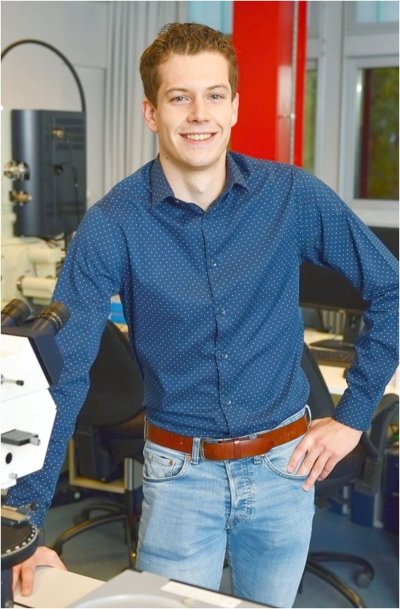Efficient Thermomechanical Modelling of Large-Scale Metal Additive Manufacturing
Björn Nijhuis is a PhD student in the department Nonlinear Solid Mechanics. (Co)Supervisors are prof.dr.ir. A.H. van den Boogaard, dr.ir. H.J.M. Geijselaers and dr.ir. G.T. Havinga from the faculty of Engineering Technology.
 With directed energy deposition (DED), metal parts of up to multiple meters in size can be additively manufactured. The widespread industrial application of DED is, however, limited by undesired effects such as the development of excessive distortions or residual stresses. The origin of these effects is often studied using numerical models, but conventional DED process simulations are often slower than the actual process. This thesis aims to address this shortcoming by proposing methods to accelerate thermal and mechanical DED simulations.
With directed energy deposition (DED), metal parts of up to multiple meters in size can be additively manufactured. The widespread industrial application of DED is, however, limited by undesired effects such as the development of excessive distortions or residual stresses. The origin of these effects is often studied using numerical models, but conventional DED process simulations are often slower than the actual process. This thesis aims to address this shortcoming by proposing methods to accelerate thermal and mechanical DED simulations.
Thermal DED simulations are accelerated by means of a simplified heat input model and an efficient discretisation scheme. A hot element addition heat input model is proposed that efficiently combines material deposition and heat input. Spatial discretisation with the discontinuous Galerkin finite element method allows to correctly capture the temperature discontinuity between newly deposited hot elements and already present cooler elements. Accurate temperature predictions are obtained even on coarse meshes, so that thermal DED simulations can be accelerated by limiting the size of the system of equations that has to be solved. With the fully explicit solution scheme, the thermal history is obtained through numerically cheap matrix-vector multiplications at the element level. This scheme naturally enables local time-stepping, allowing solution components of large elements to be updated less often than those of small elements, which further accelerates thermal DED simulations of realistic geometries.
Mechanical DED simulations are accelerated using local model-order reduction based on proper orthogonal decomposition (POD). Displacements in regions of the model that behave linearly are approximated with a limited set of deformation modes, whereas those in nonlinear regions are resolved in full detail. A dual-primal domain decomposition method efficiently couples the reduced-order and full-order regions. A novel type of POD-based deformation modes, termed covariant modes, is proposed to obtain accurate predictions of both overall deformations and local stresses. The proposed local MOR-method significantly accelerates the mechanical simulation of DED-processes, while accurately predicting deformations, stresses and plastic strains during the deposition process.


